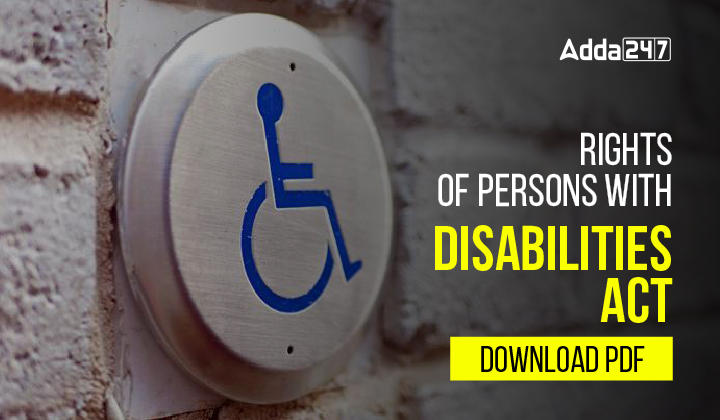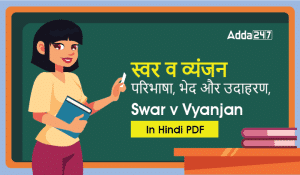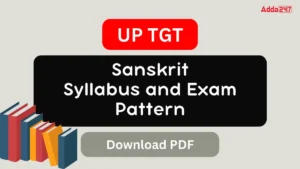Table of Contents
The Rights of Persons with Disabilities (RPwD) Act, 2016, identifies 21 disabilities to empower individuals with disabilities to exercise their rights effectively. This Act aims to ensure that women and children with disabilities enjoy their rights on an equal footing with others. Here, we will explore the origin, implementation, functioning, and facilities provided under the RPwD Act, 2016, designed to support and benefit persons with disabilities.
Persons with Disabilities Act, 1995/ विकलांग व्यक्ति अधिनियम, 1995
The Persons with Disabilities (Equal Opportunities, Protection of Rights, and Full Participation) Act, 1995, came into effect on February 7, 1996. This legislation marks a significant milestone in promoting equal opportunities for persons with disabilities and fostering their active participation in nation-building.
The Act encompasses both preventive and promotional measures for rehabilitation, including provisions for education, employment, vocational training, job reservations, research, manpower development, and the creation of barrier-free environments. It also addresses rehabilitation for persons with disabilities, unemployment allowances, special insurance schemes for disabled employees, and the establishment of homes for individuals with severe disabilities.
विकलांग व्यक्ति (समान अवसर, अधिकारों का संरक्षण और पूर्ण भागीदारी अधिनियम, 1995) 7 फरवरी 1996 को लागू हुआ। यह कानून एक महत्वपूर्ण मील का पत्थर है और विकलांग लोगों के लिए समान अवसर सुनिश्चित करने और राष्ट्र निर्माण में उनकी पूर्ण भागीदारी सुनिश्चित करने की दिशा में एक महत्वपूर्ण कदम है। अधिनियम में पुनर्वास, शिक्षा, रोजगार और व्यावसायिक प्रशिक्षण, नौकरी आरक्षण, अनुसंधान और मानव शक्ति विकास, बाधा मुक्त वातावरण का निर्माण, विकलांगता से ग्रस्त व्यक्ति का पुनर्वास, विकलांगों के लिए बेरोजगारी भत्ता, विशेष बीमा योजना, विकलांग कर्मचारियों और गंभीर विकलांगता वाले व्यक्ति के लिए घर की स्थापना आदि के लिए निवारक और प्रचार संबंधी दोनों पहलुओं का प्रावधान है।
The PWD Act has both binding entitlements and more general commitment. The key provisions are: पीडब्ल्यूडी अधिनियम में बाध्यकारी अधिकार और अधिक सामान्य प्रतिबद्धता दोनों हैं। प्रमुख प्रावधान हैं:
PWD Act Key Pointers
Here are some key pointers from the Act:
- Definition of Disability: The Act defines disability as any condition that significantly limits one or more major life activities. It includes physical, sensory, intellectual, mental, and multiple disabilities.
- Types of Disabilities: A total of 21 disabilities are recognized under the Act, including blindness, low vision, hearing impairment, locomotor disability, intellectual disability, mental illness, and autism.
- Rights of Persons with Disabilities: The Act ensures various rights, such as equality, non-discrimination, access to education, employment, health services, and the right to participate in political and public life.
- Accessibility: Public buildings, transportation systems, and information and communication technologies must be accessible to persons with disabilities. The government is also required to provide assistive devices and technologies.
- Special Provisions: The Act includes measures like seat reservations in educational institutions and government jobs, and the establishment of special courts for speedy resolution of cases involving rights violations.
- Implementation: The Act mandates the formation of National and State Disability Rights Commissions to oversee its implementation and ensure the protection of rights for persons with disabilities.
Education:
The following are binding on government: शिक्षा: निम्नलिखित प्रावधान सरकार पर बाध्यकारी हैं:
- Governments shall ensure that every Child with disability has access to free education” in an appropriate environment” until the age of eighteen.
सरकारें यह सुनिश्चित करेंगी कि विकलांगता से पीड़ित प्रत्येक बच्चे को अठारह वर्ष की आयु तक “उपयुक्त वातावरण में” मुफ्त शिक्षा प्राप्त हो।
- Governments “shall initiate or cause to be initiated” research by public and non-governmental agencies for development of both assistive devices and special learning materials for PWD in order to promote equal opportunity in education.
शिक्षा के क्षेत्र में समान अवसर को बढ़ावा देने के लिए PWD के लिए सहायक उपकरण और विशेष शिक्षण सामग्री दोनों के विकास के लिए सरकार और सार्वजनिक और गैर-सरकारी एजेंसियों द्वारा अनुसंधान “शुरू कर सकती है या इसका कारण बन सकती है”.
- Government shall ensure teacher training that produces “the requisite manpower” for teaching of PWD both in special schools and integrated settings.
सरकार ऐसे शिक्षकों का प्रशिक्षण सुनिश्चित करेगी जो विशेष स्कूलों और एकीकृत सेटिंग दोनों में PWD के शिक्षण के लिए “अपेक्षित जनशक्ति” का निर्मित करते हैं
- All public educational institutional and others receiving aid from governments shall reserve not less than 3 percent of seats for PWD (i.e. for PWD over 18 years)
सभी सार्वजनिक शैक्षिक संस्थागत और सरकार से सहायता प्राप्त करने वाले अन्य लोग पीडब्ल्यूडी (यानी 18 वर्ष से अधिक पीडब्ल्यूडी के लिए) के लिए 3 प्रतिशत से कम सीटें आरक्षित नहीं करेंगे।
- Governments should prepare a “Comprehensive Education Scheme” for PWD which includes transport of financial incentives, barrier free access, supply of books, uniforms and learning materials to PWD, adjusts the examination system as necessary, adaption in curriculum for PWD.
सरकारों को PWD के लिए एक “व्यापक शिक्षा योजना” तैयार करनी चाहिए, जिसमें वित्तीय प्रोत्साहन, बाधा मुक्त पहुंच, पुस्तकों की आपूर्ति, PWD के लिए वर्दी और शिक्षण सामग्री, परीक्षा प्रणाली को आवश्यकतानुसार समायोजित करना, PWD के लिए पाठ्यक्रम में अनुकूलन शामिल है.
Employment:
The government shall:
- Identify posts for PWD in public establishment and update the list every three years. सार्वजनिक संस्थान में पीडब्ल्यूडी के लिए पदों की पहचान करें और हर तीन साल में सूची को अपडेट करें।
- Reserve not less than 3 percent of identified posts for PWD with 1 percentage point reserved for people with blindness/ low vision, hearing impairment, locomotor disability or cerebral palsy respectively. दृष्टिहीनता / कम दृष्टि, श्रवण हानि, लोकोमोटर विकलांगता या मस्तिष्क पक्षाघात वाले लोगों के लिए 1 प्रतिशत अंक वाले पीडब्ल्यूडी के लिए आरक्षित पदों के 3 प्रतिशत से कम नहीं।
- Every employer should have a record of all PWD employed in his establishment. प्रत्येक नियोक्ता के पास अपने संस्थान में नियुक्त सभी PWD का रिकॉर्ड होना चाहिए।
- Government and local authorities shall formulate schemes for promotion of employment of PWD which may provide for training of PWD, relaxation of age limit in employment. Measures related to OHS, provisions for financing such schemes etc. सरकार और स्थानीय प्राधिकरण पीडब्ल्यूडी के रोजगार को बढ़ावा देने के लिए योजनाएँ तैयार करेंगे जो पीडब्ल्यूडी के प्रशिक्षण, रोजगार में आयु सीमा में छूट, ओएचएस से संबंधित उपाय, इस तरह की योजनाओं के वित्तपोषण के लिए प्रावधान इत्यादि प्रदान करेंगे।
- Reservation of not less than 3 percent in all poverty alleviation schemes. सभी गरीबी उन्मूलन योजनाओं में 3 प्रतिशत से कम का आरक्षण नहीं.
- Within the limit of their economic capacity and development”, Governments shall provide incentive to both and private sectors for employment of PWD with target of at least 5 percent of their work force to be PWD. उनकी आर्थिक क्षमता और विकास की सीमा के भीतर, सरकारें पीडब्ल्यूडी के रोजगार के लिए दोनों और निजी क्षेत्रों को प्रोत्साहन प्रदान करेंगी, जिसमें उनके कार्यबल का कम से कम 5 प्रतिशत पीडब्ल्यूडी होने का लक्ष्य होगा।
Rights of Persons With Disabilities Act, 2016 / विकलांगजन का अधिकार अधिनियम, 2016
Rights of Persons With Disabilities Act, 2016 (R.P.W.D.) was enacted under the Article 253 of the Constitution of India read with item No. 13 of the Union List. This Act is considered to be comprehensive and it aims to provide equal opportunities to persons with disabilities in India
विकलांग व्यक्तियों का अधिकार अधिनियम, 2016 (R.P.W.D.) को भारत के संविधान के अनुच्छेद 253 के तहत संघ सूची के आइटम नंबर 13 के साथ पढ़ा गया था। इस अधिनियम को व्यापक माना जाता है और इसका उद्देश्य भारत में विकलांग व्यक्तियों को समान अवसर प्रदान करना है
- This act was passed to fulfill India’s obligation to UNCRPD. यह अधिनियम UNCRPD के लिए भारत के दायित्व को पूरा करने के लिए पारित किया गया था
- Draft Bill of this Act was created in 2011. इस अधिनियम का मसौदा 2011 में बनाया गया था
- The Bill was passed by the Rajya Sabha on 14 December 2016 and by Lok Sabha on 17 December 2016. इस विधेयक को राज्य सभा ने 14 दिसंबर 2016 को और लोकसभा ने 17 दिसंबर 2016 को पारित किया था
- Rights of Persons With Disabilities Act, 2016 came into effect on 30 December 2016 विकलांग व्यक्तियों का अधिकार अधिनियम, 2016 30 दिसंबर 2016 को प्रभावी हुआ.
- It replaced the Persons with Disability (P.w.D.) Act that was enacted way back in 1995 इसने विकलांग व्यक्ति अधिनियम Disability (P.w.D.) को प्रतिस्थापित किया जो 1995 में अधिनियमित किया गया था.
- To increase the job opportunities of persons with disabilities, the Act has increased the reservation quota from 3% to 4%. This means that 4% of all vacancies in the government organizations will be reserved for disabled people. विकलांग व्यक्तियों के नौकरी के अवसरों को बढ़ाने के लिए, अधिनियम ने आरक्षण कोटा 3% से बढ़ाकर 4% कर दिया है। इसका मतलब यह है कि सरकारी संगठनों में सभी रिक्तियों का 4% विकलांग लोगों के लिए आरक्षित होगा
- This act proposes that every child with disability gets free education from the age of 6 to 18. इस अधिनियम का प्रस्ताव है कि विकलांगता से पीड़ित प्रत्येक बच्चे को 6 से 18 वर्ष की आयु तक मुफ्त शिक्षा मिलती है.
- The Act covers the following specified disabilities:
| RPWD Disabilities | ||
|---|---|---|
| Physical Disability | Locomotor Disability |
|
| Visual Impairment |
|
|
| Hearing Impairment |
|
|
| Speech and Language Disability | ||
| Intellectual Disability |
|
– |
| Mental Behaviour (Mental Illness) | – | – |
| Disability caused due to | Chronic Neurological Conditions such as |
|
| Blood Disorder |
|
|
| Multiple Disabilities | – | – |
Persons with Disabilities Act Notes PDF
Download the notes on the Right of Persons with Disabilities Act from the following link.




 Phases of Teaching - Stages of Teaching ...
Phases of Teaching - Stages of Teaching ...
 स्वर व व्यंजन - �...
स्वर व व्यंजन - �...
 UP TGT Sanskrit Syllabus and Exam Patter...
UP TGT Sanskrit Syllabus and Exam Patter...




